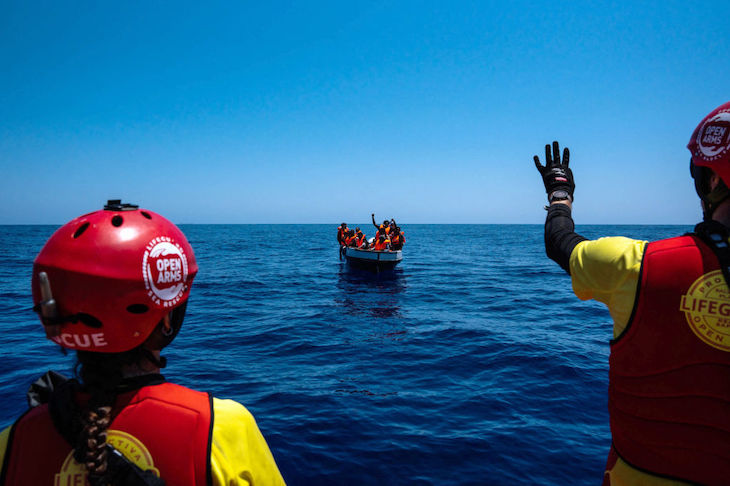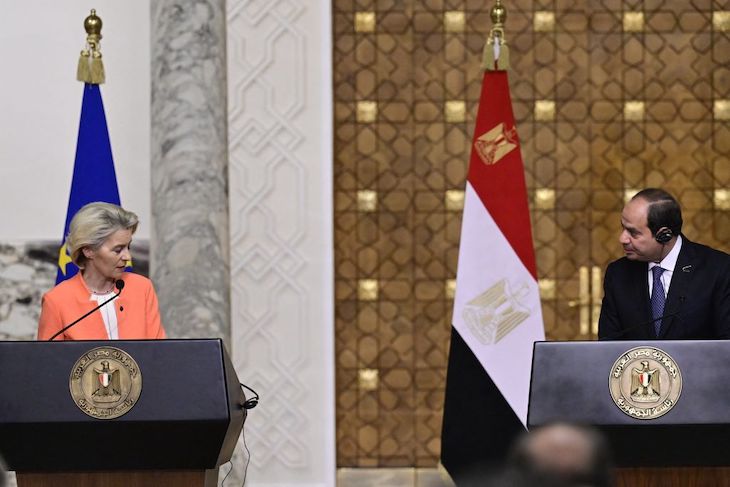(sublinhados meus) - Continuamos, alegremente, a assobiar para o ar!
The EU is divided in its bid to stop the boats

There was good and bad news for the European Union last week: the number of migrants arriving in Europe on the Central Mediterranean route in the first two months of 2024 dropped 70 per cent compared to the same period the previous year, the latest figures revealed. The bad news was that they were up 117 per cent on the eastern Mediterranean route. The really bad news was that they were up 541 per cent on the West African route as Malians, Senegalese and Mauritanians arrived in large numbers on Spanish territory. The nationalities crossing the Eastern Mediterranean in the greatest number are Afghans, Syrians and Egyptians.
The figures will rise in the months ahead
January and February are traditionally the slowest months of the years for crossings, so the figures will likely rise in the months ahead as the people smuggling gangs make the most of the more clement weather.
Other factors will also contribute to the surge in migrants making their way to Europe. This year record numbers of Sudanese refugees have been arriving in Tunisia as the Civil War in Sudan displaces more people. In a recent article for Chatham House, Rosalind Marsden, former British Ambassador to Sudan, said the country was in the grip of ‘a humanitarian disaster’, with 11 million people displaced inside or outside the country. According to Marsden, Sudan has become a ‘proxy war’ with Russia and Iran providing military and financial support to the rival factions. ‘The conflict has the potential to destabilise already fragile neighbouring countries, create large new migration flows to Europe, and attract extremist groups,’ explained Marsden.
That is already happening as refugees escape to neighbouring countries. While some head to Tunisia, an estimated four million Sudanese have crossed into Egypt, placing more pressure on a country already confronted with a humanitarian crisis on its northern border. There are approximately 1.4 million displaced Palestinians in makeshift camps in and around the southern city of Rafah, just across the border from Egypt. Egypt provides aid to the refugees but has so far refused to allow them to cross into their territory, fearful that once across they won’t be permitted to return by the Israelis.
To assist Egypt in its aid efforts, the European Union signed a €7.4 billion (£6.4 billion) deal in Cairo on Sunday. There is a large degree of self-interest for Brussels in signing the agreement, as there was with previous similar agreements with Libya, Tunisia and Mauritania. A migrant crisis in any North African country is inevitably a crisis for Europe.
The deal was signed in the presence of Egyptian president Abdel Fattah el-Sissi, European Commission president Ursula von der Leyen and several leaders from the Bloc’s 27 Member States. Officially titled a ‘Strategic Partnership Document’, the pact covers political relations and sustainable investment and trade.

The EU’s press release about the partnership plays down the significance of the migrant crisis, mentioning it briefly towards the end in the jargon of bureaucracy. The Union will provide financial support to Egypt on ‘migration-related programs that entail developing a holistic approach to migration including legal migration pathways in line with national competences’. This support is to the tune of €200 million (£171 million). There was also a commitment on both sides to protect ‘the rights of migrants and refugees’.
Despite these commitments, the deal was condemned by some left-wing European politicians. ‘Under the impetus of Mrs von der Leyen, Europe is being transformed into a world bank for authoritarian regimes and dictatorships,’ said the French Green MEP Mounir Satouri. He accused the Egyptian government of corruption and of political repression.
When it comes to Europe’s migrant crisis, Von der Leyen has a thankless task. Criticised by the left for being too tough on migrants, she is savaged by the right as too soft. One of her most implacable foes is Frenchman Fabrice Leggeri, the former head of Frontex, the EU’s border agency, and now a National Rally candidate in June’s European Elections. He joined Marine Le Pen because he believes hers is the only party capable of resolving the migrant crisis.
In recent weeks, Leggeri has been doing the rounds of the broadcast media in France and von der Leyen is a favourite target of his scorn. So too is Ylva Johansson, EU commissioner for Home Affairs. Leggeri alleges that during his time as Frontex chief, Johansson reminded him: ‘Your job as border guards is to welcome migrants and let them in’. (The EU has rejected the claim).
Leggeri has little confidence that the EU will ever get to grips with the migrant crisis; not just because of inept leadership but because of what he describes as ‘the tyranny of both NGOs and European law’. In his view, the pro-migrant NGOs have power and influence within Brussels, and no matter how many deals von der Leyen cuts with North African countries, these NGOs, together with human rights lawyers, will render them ineffective.
In 2021 – the year before he was forced out of his job after allegations of misconduct – Leggeri warned that ‘there is a risk of terrorism when migrants come from a conflict zone’. This risk has intensified in the three years since because of the proxy war being fought in Africa by Russia and Iran.
Gérald Darmanin, France’s interior minister, admitted last week his concern that Islamist terrorists may attempt to attack July’s Olympic Games in Paris. The month before the Games, France will host world leaders in a ceremony to mark the 80th anniversary of D-Day. The European elections are in the same week. Emmanuel Macron is trying to turn Russia into the main election issue; the right – not just in France but across Europe – want to keep the focus on immigration.
And yet the polls repeatedly show that what worries the French most is the cost-of-living crisis. The war in Ukraine and mass immigration have squeezed the working and middle classes and their quality of life has diminished. Who do they blame most: Putin or migrants? That essentially is how politicians are trying to frame June’s election.
Sem comentários:
Enviar um comentário